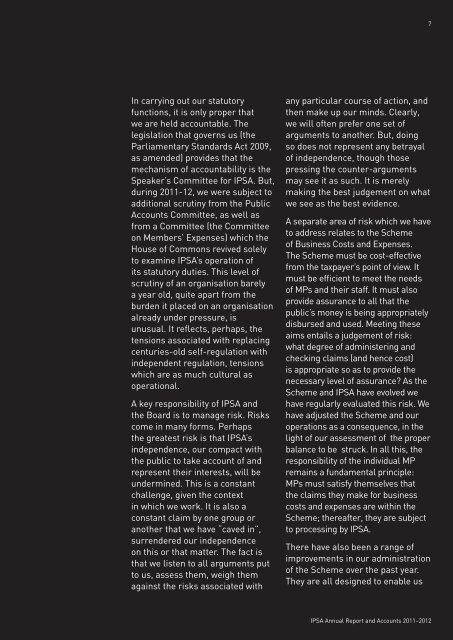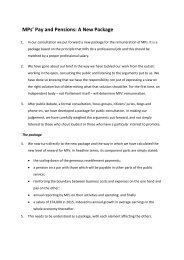Parliamentary
Annual Report and Accounts 2011â2012 - Independent ...
Annual Report and Accounts 2011â2012 - Independent ...
Create successful ePaper yourself
Turn your PDF publications into a flip-book with our unique Google optimized e-Paper software.
7<br />
In carrying out our statutory<br />
functions, it is only proper that<br />
we are held accountable. The<br />
legislation that governs us (the<br />
<strong>Parliamentary</strong> Standards Act 2009,<br />
as amended) provides that the<br />
mechanism of accountability is the<br />
Speaker’s Committee for IPSA. But,<br />
during 2011-12, we were subject to<br />
additional scrutiny from the Public<br />
Accounts Committee, as well as<br />
from a Committee (the Committee<br />
on Members’ Expenses) which the<br />
House of Commons revived solely<br />
to examine IPSA’s operation of<br />
its statutory duties. This level of<br />
scrutiny of an organisation barely<br />
a year old, quite apart from the<br />
burden it placed on an organisation<br />
already under pressure, is<br />
unusual. It reflects, perhaps, the<br />
tensions associated with replacing<br />
centuries-old self-regulation with<br />
independent regulation, tensions<br />
which are as much cultural as<br />
operational.<br />
A key responsibility of IPSA and<br />
the Board is to manage risk. Risks<br />
come in many forms. Perhaps<br />
the greatest risk is that IPSA’s<br />
independence, our compact with<br />
the public to take account of and<br />
represent their interests, will be<br />
undermined. This is a constant<br />
challenge, given the context<br />
in which we work. It is also a<br />
constant claim by one group or<br />
another that we have “caved in”,<br />
surrendered our independence<br />
on this or that matter. The fact is<br />
that we listen to all arguments put<br />
to us, assess them, weigh them<br />
against the risks associated with<br />
any particular course of action, and<br />
then make up our minds. Clearly,<br />
we will often prefer one set of<br />
arguments to another. But, doing<br />
so does not represent any betrayal<br />
of independence, though those<br />
pressing the counter-arguments<br />
may see it as such. It is merely<br />
making the best judgement on what<br />
we see as the best evidence.<br />
A separate area of risk which we have<br />
to address relates to the Scheme<br />
of Business Costs and Expenses.<br />
The Scheme must be cost-effective<br />
from the taxpayer’s point of view. It<br />
must be efficient to meet the needs<br />
of MPs and their staff. It must also<br />
provide assurance to all that the<br />
public’s money is being appropriately<br />
disbursed and used. Meeting these<br />
aims entails a judgement of risk:<br />
what degree of administering and<br />
checking claims (and hence cost)<br />
is appropriate so as to provide the<br />
necessary level of assurance? As the<br />
Scheme and IPSA have evolved we<br />
have regularly evaluated this risk. We<br />
have adjusted the Scheme and our<br />
operations as a consequence, in the<br />
light of our assessment of the proper<br />
balance to be struck. In all this, the<br />
responsibility of the individual MP<br />
remains a fundamental principle:<br />
MPs must satisfy themselves that<br />
the claims they make for business<br />
costs and expenses are within the<br />
Scheme; thereafter, they are subject<br />
to processing by IPSA.<br />
There have also been a range of<br />
improvements in our administration<br />
of the Scheme over the past year.<br />
They are all designed to enable us<br />
IPSA Annual Report and Accounts 2011–2012 2011-2012



